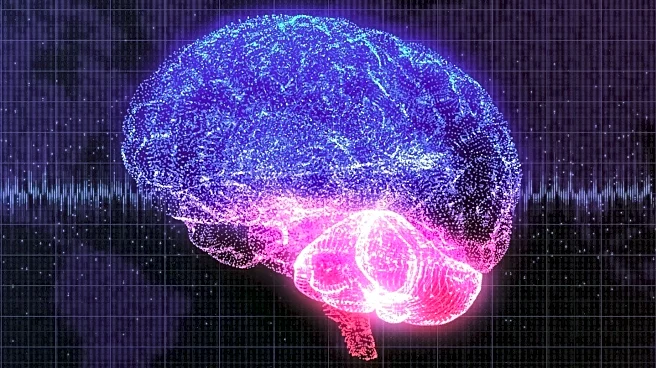What's Happening?
A new three-minute brainwave test, known as Fastball EEG, has shown promise in detecting early memory issues in individuals with Mild Cognitive Impairment (MCI) who are likely to develop Alzheimer's disease. Developed by researchers at the University of Bath and trialed in collaboration with the University of Bristol, the test uses small sensors on the scalp to record brain electrical activity while participants view a stream of images. The test identifies memory problems by analyzing the brain's automatic responses to images seen before the test. In a trial involving 54 healthy adults and 52 patients with MCI, the test successfully flagged specific memory issues, particularly in those with amnestic MCI, who are at a higher risk of developing Alzheimer's. The trial results suggest that the Fastball EEG could help identify individuals who might benefit from new Alzheimer's treatments, such as donanemab and lecanemab, at earlier stages of the disease.
Why It's Important?
Early detection of Alzheimer's disease is crucial as new treatments are proving more effective when administered in the initial stages. The Fastball EEG test offers a non-invasive, accessible method for identifying individuals at high risk of developing Alzheimer's, potentially allowing for timely intervention with emerging therapies. This could significantly impact public health by improving outcomes for patients and reducing the burden of Alzheimer's disease on healthcare systems. Moreover, the ability to conduct the test in patients' homes enhances accessibility and reduces anxiety, making it a practical tool for widespread use. If larger studies confirm these findings, the test could become a valuable component of Alzheimer's risk assessment, guiding treatment decisions and improving patient care.
What's Next?
Further research is needed to validate the Fastball EEG test's effectiveness in larger and more diverse populations. Long-term studies will explore whether the test can predict the progression of memory problems over time and how it might be integrated with other diagnostic tools, such as cognitive assessments and blood tests. Researchers aim to determine if the test can reliably inform treatment decisions and improve patient outcomes. Additionally, understanding how other health conditions might influence brainwave test results will be crucial for refining its application in clinical settings. As the test undergoes further trials, it may pave the way for more personalized and effective Alzheimer's treatment strategies.
Beyond the Headlines
The development of the Fastball EEG test highlights the growing importance of early diagnosis in managing Alzheimer's disease. It underscores the need for innovative approaches to detect memory impairment before it significantly impacts daily life. The test's ability to be conducted at home represents a shift towards more patient-centered care, reducing barriers to diagnosis and treatment. Furthermore, the test's potential integration with other diagnostic methods could lead to a more comprehensive understanding of cognitive health, benefiting not only Alzheimer's patients but also those with other memory-related conditions.










